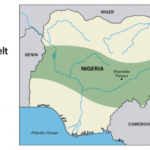The history of the misuse of funds allocated for checkmating ecological problems in Nigeria since 1981 provides ample evidence that most climatic and environmental disasters Nigerians have endured in the last five decades were self-inflicted, not due to lack of resources. Political corruption and misplaced priorities are to blame for some of the predicted natural disasters that ravage Nigeria.
To demonstrate that the government was not unaware of the ecological challenges facing the country, the civilian government of the late President Shehu Shagari established the Federation Account Act of 1981, after reviewing the report of the Okigbo Commission on environmental challenges in Nigeria. The successive military governments kept the law alive through Decrees 36 of 1984 and 106 of 1992. In 2002, the civilian government increased the allocations to states for tackling ecological challenges through the allocation of the Federation Account modification Act of 2002. The Fund, which was originally constituted as one percent (1%) of the Federation Account was reviewed to 2% in 1992, and later 1% of the derivation allocation was added, thus bringing the total percentage to three per cent (3%).
According to a statement on the website of the Ecological Fund Office, subsumed under the Office of the Secretary to the Government of the Federation, the ecological problems are challenges ravaging communities across the country which include soil erosion, flood, drought, desertification, oil spillage, pollution, general environmental pollution, storm, tornadoes, bush fire, crop pest, landslide, earthquakes, etc. The core mandates of the Ecological Fund Office, therefore, include efforts to “reduce ecological problems nationwide to the barest minimum; facilitate quality and effective implementation of projects; judicious and equitable utilisation of the Fund; and effective management of Ecological Fund Projects.”
Over the years, each state of the federation and the Federal Capital Territory (FCT) received sums due to them from the Federation Account to deal with ecological problems. The Ecological Funds Office also received the allocations to the federal government, which is utilised to deal with ecological challenges. But what has become more prominent is the half-hearted implementation of projects and the report of the misuse and embezzlement of the lion share of the allocations to the Fund.
- #FearlessInOctober: Presidency moves to stop protest
- Jonathan, Dangote, Matawalle, Ighodalo, others in the news
The federal government and National Assembly are not unaware of the fraudulent deployment of the funds. For instance, in the Seventh Senate, Senator Mohammed Hassan (Yobe South) made a case for transparency, accountability and credibility in the use of the Fund in a motion. He provided a catalogue of abuses of the fund. He made reference to a N200 billion belonging to the Ecological Fund but was spent on questionable or non-existent projects that had no bearing on ecological challenges. The senator made reference to another N146.6 billion withdrawn from the Fund in 2010 and distributed as loans to individuals and agencies, not related to ecological issues. He claimed further that in 2013, some N22 billion was withdrawn from the Ecological Fund and distributed to states and local governments in clumsy circumstances. That same year the sum of N2 billion was withdrawn for building the Second Niger Bridge, though there was nothing on ground to justify the expenditure.
The funds allocated for tackling ecological issues are viewed as idle, slush funds by both the federal and local governments. It is seen as the money that could be accessed and deployed to fund political parties and prosecute electioneering campaigns. From the Ecological Fund, some administrations at the federal level have been reported to have provided financial support for states in its good books, as the release of money from that account seems not to be tied to any criteria. On the Ecological Funds Office website, there is a long list of projects executed or ongoing across the country since 2017, but many small projects like street culverts, erosion control in small towns, or supply medical waste incinerators could be ongoing for three or four years without being completed.
It is clear that Nigeria is facing existential challenges from climate change. Desertification and constant flooding in most parts of Nigeria can no longer be ignored. They are responsible for insecurity, conflict and even food scarcity in the last few years. Since 2012, annual floods have washed away crops. Several rural communities have been either devastated or erased from the map of Nigeria. The revenue allocations received by state and federal governments are meant to prevent such disasters.
Nigerians must insist that the ecological funds are applied to environmental issues across. Between June 2023 and May 2024, the 36 states of the Federation received N39.62 billion from the Ecological Fund. That is an average of N1 billion for each state. How did state governors utilise the funds? The state Houses of Assembly and the National Assembly must weigh in and insist that the Executive arm of government gives an account of how the funds were deployed. When the government introduced the allocation of revenue to deal with ecological problems in 1981, the idea was not to create a slush fund for politicians. Ecological funds must be applied to deal with climatic threats to the people.

 Join Daily Trust WhatsApp Community For Quick Access To News and Happenings Around You.
Join Daily Trust WhatsApp Community For Quick Access To News and Happenings Around You.


